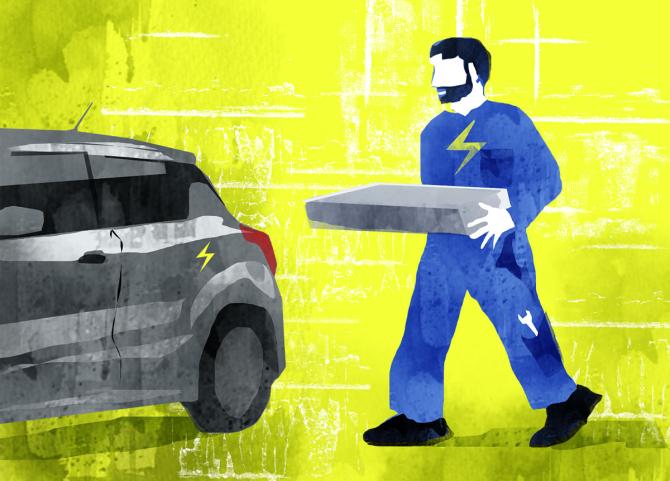It’s cheaper than buying a new EV and the sentiment that many Indians attach to vehicles is retained.
S Dinakar reports.

India has a history of jugaad, and retrofitting vehicles is one such manifestation of the legendary Indian skill.
Not so long ago autorickshaws and small Marutis used to strap on subsidised LPG cylinders and power themselves to a cheap ride.
There were the odd explosions, lives were lost, but the jugaad continued.
Then compressed natural gas (CNG) was introduced in Delhi following a court order.
Initially, customised CNG kits were fitted to conventional (internal combustion engine or ICE) autos cheaply, enabling commuting at less than half of what you would cough up for diesel.
The industry is better organised now with Suzuki and Hyundai designing CNG-fired vehicles, and Mahindra and TVS manufacturing liquefied petroleum gas (LPG)-powered three wheelers.
Something similar is happening to electric vehicles (EVs), with scores of small companies springing up across India, trying to replicate the experiences with auto LPG and CNG.
The idea is similar. Take an existing two-wheeler EV (2WEV), remove the ICE engine and fit a motor, controller and battery.
It’s cheaper than buying a new EV and the sentiment that many Indians attach to vehicles is retained.
“China also initially came up with a lot of retrofit kits and retrofitted existing vehicles," said EV maker Bounce co-founder and chief operating officer Anil G, the first and perhaps only organised player to enter the retrofitting business.
Retrofitting is a very easy way to convert the existing stock of vehicles to non-polluting EVs if the price is right, said Shrikant Shinde, founder and CEO of Mumbai-based EV service provider GoGoA1, which specialises in retrofitting existing 2Ws to EVs.
The gains are visible for the government because retrofitting is a low-hanging fruit — a cheaper and faster way to electrify our petrol-laden vehicle ecosystem than to incentivise sales and production of new EVs.
One could retrofit a 2W for a fourth of what it would cost to buy a new EV where the battery is included as a service.
With government doles, such as those given for new EVs, it could be even cheaper.
There’s also the behavioural factor.
“People are emotionally attached to their vehicles in India,” said Abhijeet Sinha, project director, NHEV, an EV solutions consultancy.
Many consider their vehicles lucky and are reluctant to change them. Retrofitting may enable them to keep their vehicles and still avoid paying for gas, Shinde said.
Bounce and GoGoA1 are two faces of the retrofitting industry. Bounce makes its own batteries along with a battery management system, a key to avoiding accidents, Anil said.
GoGoA1 sources its batteries from Trontek and Nexcharge, a joint venture between India’s Exide and Switzerland’s Leclanche.
Both make the conversion kits, which typically include motors, controllers and a wiring harness, and work with partners to modify ICE vehicles at Regional Transport Office (RTO)-approved conversion centres.
In addition, there are small unapproved garages that also retrofit vehicles with substandard batteries and motors, Shinde said.
GoGoA1 has focused on converting bikes such as the popular Hero Splendor, while Bounce has targeted scooters such as Honda Activa and TVS Jupiter.
Bounce began deliveries of its Infinity scooter from April, after gaining three years of experience in testing batteries across places and temperatures for its fleet.
It plans to translate the same experience to retrofitting by modifying existing vehicles under a new brand name, Zuink.
The battery that goes into Zuink is the same that goes into Infinity, Anil said.
The kit, comprising a 1.5 KV-motor and controller costs around Rs 25,000.
A 2Kwh battery is sold separately, with Bounce pitching in with battery-swapping to lower costs of ownership.
GoGo kits cost more, at Rs 37,700, which include a 2KV motor, controller and wiring.
The 3Kwh lithium-ion battery and charger cost Rs 65,000.
One reason for higher battery costs is that the government charges 5 per cent goods and services tax (GST) on batteries that go into new EVs, but 18 per cent on units sold separately.
Bounce has a conversion centre at its main office in Bengaluru and plans to open a few more in cities where it can also offer battery-swapping services.
Shinde said that he has finalised franchisees for around 60 conversion centres across India, which are in the process of securing approval from local RTOs.
New Delhi has ignored the retrofitting industry while ploughing thousands of crores into new EV manufacturers, an industry official said. Unlike big automakers like Bajaj, TVS or Ola, which have access to senior government functionaries, the retrofitting industry, as of now, is a scattered, unorganised sector, powered by small and medium manufacturers.
They possess neither the financial heft nor the clout to lobby Delhi.
But the government will be unable to meet ambitious vehicle electrification targets — especially given the rising costs of new EVs, higher interest rates and weak consumer demand—unless it comes out with a detailed policy and a strong incentive structure, another senior official with a retrofitter said.
Two issues plague the industry.
There is a raft of approvals from agencies such as Automotive Research Association of India (ARAI) and the RTOs, which can take anywhere from six months to three years, say industry officials.
Retrofitters need to take approvals for each and every model, which means separate nods for Activa, Jupiter or Splendour, even if the vehicles carry engines of similar capacity.
In the case of CNG and LPG, the government gave segment-wise approvals or in terms of vehicle capacity, an industry official said.
The EV approval process is very time consuming and expensive, especially for an industry dominated by small players, Shinde said.
The components in the kit — motor, motor controller, battery, charger, battery level indicator, wiring harness — need to be approved by the ARAI, and then the vehicle has to be okayed.
Shinde said that they have asked for a blanket approval for 90-175cc vehicles, irrespective of the model.
Financing retrofitted vehicles, especially with swappable batteries, is a challenge as banks are wary, Shinde said.
“When you talk to financiers, they are not comfortable funding swappable batteries,”' Hemal Thakkar, director, Crisil Research said.
Delhi allotted Rs 10,000 crore under the Faster Adoption and Manufacturing of (Hybrid &) Electric Vehicles (FAME) 2 EV subsidy programme to create demand for EVs, with tens of thousands of rupees given as subsidy for sales of each new 2WEV.
But there is no comparable incentive for retrofitters.
On the contrary, the battery carries a 13 percentage point higher GST compared to new vehicles.
The retrofitting industry lacks both subsidy and a clear policy, Anil said.
“We are working with NITI Aayog for a retrofit policy, while some state governments like Karnataka and Goa are formulating policies,” he added.
India, which houses most of the world’s polluted cities, including Delhi, is adopting EVs to reduce pollution. But over 220 million conventional two- wheelers in India feed on petrol, and they will not disappear anytime soon.
Until they are around, pollution will continue to haunt cities.
Retrofitting could fast-track the transition to cleaner air.
Retro movement
A retrofitted 2WEV can cost as little as a fourth of a new EV where the battery is included as a service
Retrofitting can give a fillip to the recently announced draft battery-swapping policy as customers get to drive their existing vehicles without spending on the most expensive EV component — the battery
Conversion kits from Bounce cost as little as Rs 25,000, compared to the price of Rs 1 lakh for a new EV. The battery can be availed of as a subscription on the lines of a prepaid card for a mobile connection
In the absence of clear-cut central government directives, the approval process is time consuming and expensive. RTOs often tend to delay or deny approvals for conversion centres, and the need to get the nod of every RTO hinders building of scale
Lack of a clear-cut policy and incentives for retrofitting keeps away organised players, while thousands of small, unapproved garages retrofit vehicles with substandard batteries and motors, leading to fires and accidents
Battery costs are higher for retrofitted vehicles because the government charges 5 per cent GST on batteries that go into new EVs but 18 per cent on units sold separately.












 © 2025
© 2025